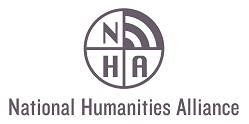Finding ways to navigate an increasingly digitally complex research and publishing ecosystem can be a challenge, but it also presents a wonderful opportunity for those involved in scholarly communication to support new research practices now emerging. As we continue to embed ourselves more deeply in our specialist communities, how might publishers work alongside scholars to support this evolution and respond to needs emerging now and in the future?
 Over the course of the past two years, across the Routledge Humanities, Media and the Arts portfolios we have been collaborating with colleagues from the National Humanities Alliance (US) to advocate for and support the work of humanities researchers and practitioners. This has resulted in a number of activities including: in-house talks and conference presentations, content marketing campaigns, a Publishing and Public Humanities working group and most recently, co-presenting an interactive mapping session at the only festival of persistent identifiers: PIDapalooza!
Over the course of the past two years, across the Routledge Humanities, Media and the Arts portfolios we have been collaborating with colleagues from the National Humanities Alliance (US) to advocate for and support the work of humanities researchers and practitioners. This has resulted in a number of activities including: in-house talks and conference presentations, content marketing campaigns, a Publishing and Public Humanities working group and most recently, co-presenting an interactive mapping session at the only festival of persistent identifiers: PIDapalooza!
The innovative nature of publicly engaged work, driven, often, by co-equal partnership with community members and institutions, broadens the horizons and inclusivity of humanities knowledge. It also, however, creates certain challenges that make publication both more complex and more important. For instance:
- How can publication express the different voices of partners and participants?
- How can publication expose the sometimes messy process of the project?
- What is the value of publication to project participants and stakeholders?
- How is the quality of engaged work evaluated? Who handles peer review?
- How can research evaluation systems better recognize and reward engaged scholarship?
In our working group we have explored these challenges and more to outline model practices associated with publishing publicly engaged scholarship in the humanities. As the digital platforms, workflows and processes of scholarly communication continue to evolve, capturing the methodologies and outcomes of engaged work in our publications can help build connections within and beyond research communities to address what matters, not just what counts.
I also recently joined a panel of scholarly communication specialists (Stephanie Dawson; ScienceOpen and Sara J Cohen; University of Michigan Press) discussing innovative forms of scholarly publishing at the NISO+ conference.
Our working group will convene a panel with Society executives and Library specialists at the SSP 43rd conference (Charting a New Course: from Chaos to Innovation) in May 2021 – embracing public humanities values by engaging with a wider audience of participants.
If you want to find out more about engaged work in the humanities, the challenges, opportunities and model practices for publication and continue the conversation – please join our group on Humanities Commons.
Further reading
- For more on the definition of engaged work in the humanities see Daniel Fisher’s blog post, A Typology of the Publicly Engaged Humanities
- Our working paper, Public Humanities and Publication
